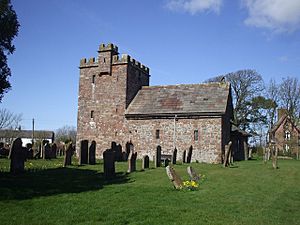St John the Evangelist's Church, Newton Arlosh facts for kids
Quick facts for kids St John the Evangelist's Church |
|
|---|---|

St John's Church from the south
|
|
| Lua error in Module:Location_map at line 420: attempt to index field 'wikibase' (a nil value). | |
| OS grid reference | NY 198 552 |
| Location | Newton Arlosh, Cumbria |
| Country | England |
| Denomination | Anglican |
| Website | Newton Arlosh, St John |
| History | |
| Status | Parish church |
| Founded | 1303 |
| Founder(s) | Holm Cultram Abbey |
| Architecture | |
| Functional status | Active |
| Heritage designation | Grade I |
| Designated | 1 April 1967 |
| Architectural type | Church |
| Style | Fortified |
| Groundbreaking | 1303 |
| Completed | 1894 |
| Specifications | |
| Materials | Sandstone with cobbles |
| Administration | |
| Parish | St John, Newton Arlosh |
| Deanery | Carlisle |
| Archdeaconry | Carlisle |
| Diocese | Carlisle |
| Province | York |
St John the Evangelist's Church is a historic building in the small village of Newton Arlosh, located in Cumbria, England. It is an active Anglican church, meaning it belongs to the Church of England. This church is special because it was built like a small fortress. Many churches near the Scottish border were built this way long ago to protect people from attacks.
The church was repaired and made bigger in the 1800s. Today, St John's Church is a very important building. It is listed as a Grade I building on the National Heritage List for England. This means it is considered to be of exceptional historical and architectural interest.
Contents
A Look at the Church's Past
St John's Church was first built in the year 1303. It was constructed by monks from a nearby place called Holm Cultram Abbey in Abbeytown. In 1304, the church was given special permission to add battlements, which are the protective walls found on castles. This shows how important it was for the church to be a strong, safe place.
After the 1500s, when many monasteries were closed down in England, the church fell into disrepair. It stayed in ruins for a long time. Then, in 1844, a woman named Sara Losh helped to restore and extend it. She added a new part called a chancel to the north side of the main church building. The church was improved even more in 1894 with more repairs and new furniture.
Exploring the Church's Design
Outside the Church
The original church was built using large red sandstone blocks mixed with round cobbles. The newer parts are made of red sandstone. All the roofs are covered with flat sandstone tiles, except for the tower roof, which has lead.
The church has a strong, square tower at its west end. This tower has very thick walls, like a castle. The main part of the church, called the nave, is also built to be strong. On the north side, there's a chancel with a small, rounded room called an apsidal vestry.
You can't enter the tower from outside. You go into it from inside the church on the first floor. The ground floor of the tower has a rounded stone ceiling. Inside the tower, a spiral staircase leads up to a room with a fireplace. All the windows in the tower are narrow slits, like those used for shooting arrows. Some of these are original, and some were added later. The top of the tower has a protective wall with gaps, and a small projecting tower on the south side. The south wall of the nave has a narrow door and more arrow-slit windows. The chancel has a round-arched doorway and tall, narrow windows. On the roof of the nave, you can see a carved eagle made by Sarah Losh.
Inside the Church
Inside St John's Church, you can find more interesting work by Sarah Losh. On the east wall of the nave, near where the original altar would have been, there are stone supports shaped like rams' heads. Sarah Losh also designed the lectern, which is a stand for reading. Its base is made from very old wood called bog oak. She also made another base shaped like a palm tree, which was meant to be part of the pulpit, a raised platform for speaking.
The oldest piece of furniture in the church is the font, which was brought from Holm Cultram Abbey. It is from the 1200s and has an eight-sided bowl with decorative carvings.
Images for kids
 | Roy Wilkins |
 | John Lewis |
 | Linda Carol Brown |


